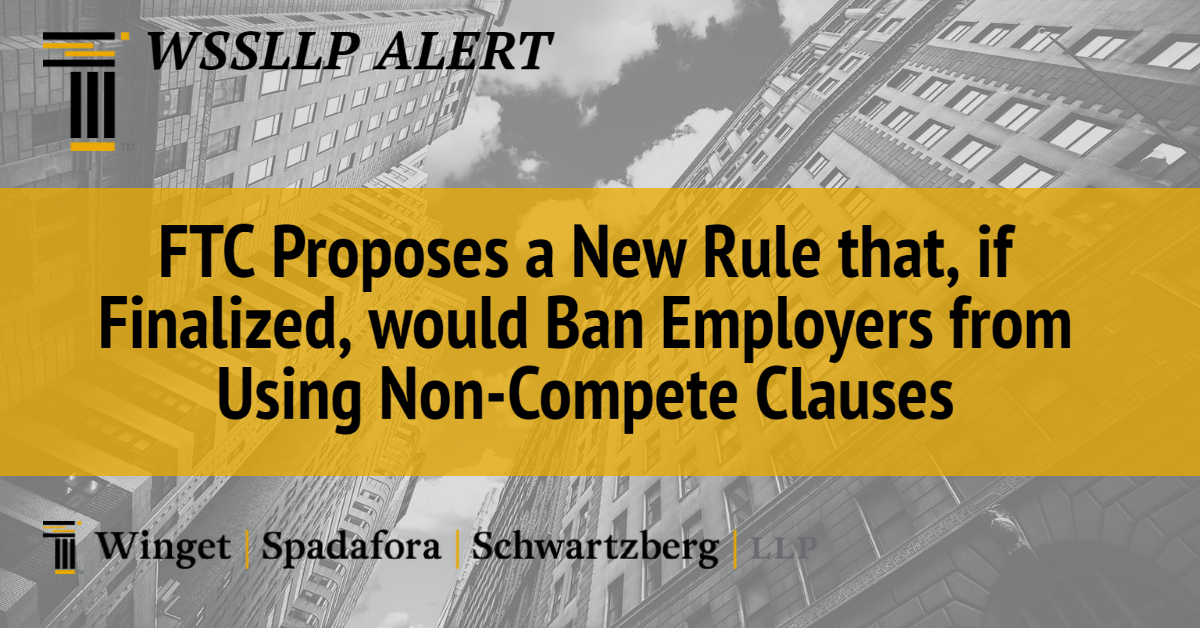On January 5, 2023, the Federal Trade Commission (“FTC”) proposed a new rule that would ban employers from imposing non-compete clauses on their workers and require employers to rescind any existing non-compete agreements with current and former workers. The FTC will soon publish the proposed rule in the Federal Register, triggering a 60-day public comment period during which time the public can submit comments which the FTC will review and consider in its finalization of the rule. The FTC may finalize the proposed rule by the end of this year, though the rule faces significant legal challenges. The proposed rule, if finalized, would have broad and deep implications for employers – nullifying non-compete clauses that have long been used to protect businesses. A link to the proposed rule can be found here.
The Federal Trade Commission’s Concerns About Employers’ Use of Non-Compete Clauses
Through public statements after the announcement of the rule, the FTC identified the following concerns which led to the proposed rule[1]:
- Non-compete clauses reduce competition in the economy: The FTC stated that non-compete clauses reduce competition in labor markets by preventing job mobility, resulting in fewer opportunities and suppressing earnings since firms have less incentives to compete over workers by offering higher salaries or better benefits[2].
- Non-compete clauses reduce innovation: The FTC stated that there is evidence showing that non-compete clauses have a negative effect on innovation, by decreasing the free flow of information and talent amongst firms – especially start-ups – which, in turn, limits the formation of new businesses and products[3].
- State level efforts to limit or ban noncompete clauses have been ineffective: Several states already have limits or bans on the use of non-compete clauses. However, the FTC indicated that research shows employers in those states still use non-compete agreements. In addition, employers in those states may circumvent such laws using choice-of law or forum-selection provisions, thereby utilizing the more tolerant laws or rules of another state. This has sowed confusion amongst affected workers and has deterred them from seeking new opportunities[4].
- A vast number of Americans are affected by a non-compete clauses: A recent Treasury Department report estimated that about one in five Americans is affected by a non-compete clause, causing wage declines[5].
The Proposed Rule: Banning Employers’ Use of Non-Compete Clauses
To address the above-mentioned concerns, the FTC has proposed this new rule[6]. The rule would deem non-compete clauses between employers and workers as an “unfair method of competition,” thereby declaring such clauses unlawful under Section 5 of the FTC Act. More specifically, the rule would make it illegal for employers to:
- enter into or attempt to enter into a non-compete clause with a worker;
- maintain a non-compete clause with a worker; or
- represent to a worker that the worker is subject to a non-compete clause where the employer has no good faith basis to believe that the worker is subject to an enforceable non-compete clause.
The proposed rule sets out a test to determine whether a contract provision is a non-compete clause: the provision must have the effect of prohibiting the worker from seeking or accepting employment with a person or operating a business after the conclusion of the worker’s employment with the employer. The proposed rule illustrates two examples of non-compete clauses that are “de-facto non-compete clauses”: (i) a non-disclosure agreement that is so broad in scope that it precludes the worker from working in the same field after the end of their employment with the employer; and (ii) a contract provision that requires the worker to pay the employer, or a third-party, for training costs if the worker’s employment ends within a specified time period.
The rule as proposed would apply to all workers, whether paid or unpaid. This includes, without limitation, employees, individuals classified as independent contractors, externs, interns, volunteers, apprentices, sole proprietors providing services to a client or customer, or gig economy workers. However, the rule would not apply to a franchisee in the context of a franchisee-franchisor relationship.
Of further note, the proposed rule sets out certain exceptions. First, the proposed rule would not necessarily prohibit non-disclosure and intellectual property agreements, allowing employers to use such mechanisms to protect their businesses. However, such agreements would need to be carefully drafted and narrowly-tailored in scope, as they could be deemed non-compete clauses if they are “so unusually broad in scope that they function as such.” Second, the proposed rule indicates that non-compete clauses may be used to prevent owners who are selling their businesses from competing with the buyers of their businesses. However, this exception would only apply to a seller who is an owner, member, or partner holding at least a 25% ownership interest in the business entity.
The proposed rule sets a compliance date of 180 days after the final rule is published in the Federal Register.
Anticipated Legal Challenges to the Proposed Rule
However, the proposed rule will not be finalized without facing significant opposition. Several notable figures have already heavily criticized the proposed ban[7]. Most significantly, Commissioner Christine S. Wilson – one of the three commissioners of the FTC – has issued a statement dissenting against the new proposed rule and raising several concerns, including[8]:
- that the FTC may lack the authority to promulgate the proposed rule under the unfair methods of competition provisions of the Federal Trade Commission act[9];
- that the proposed rule may conflict with the recent Supreme Court ruling on the major questions doctrine addressed in West Virginia v. EPA[10];
- that the proposed rule may be an impermissible delegation of legislative authority under the non-delegation doctrine[11]; and
- that current studies provide insufficient support for the proposed rule, noting one study which indicates that particularly in the financial services sector, the ban of non-compete clauses would have negative consequences on the industry, such as greater broker misconduct[12].
Such anticipated legal challenges leave the ultimate enforceability of the proposed rule, even if finalized, uncertain.
Employers and businesses have an opportunity to submit comments addressing their concerns about the proposed rule. Specifically, once the proposed rule is published in the Federal Register, the public will have 60 days to submit comments.
Employers should evaluate how the proposed rule, if actually finalized and not judicially struck down, would affect their businesses. If the rule is finalized and implemented, many employers’ past, present, and future relationships with their workers will be significantly changed.
Winget, Spadafora & Schwartzberg LLP is closely monitoring the FTC’s proposed rule. If you have any questions about the proposed rule, please contact Harris B. Katz, Esq., a Partner of the firm and a member of the firm’s employment practices group.
[1] Statement of Chair Lina M. Khan, Joined by Commissioner Rebecca Kelly Slaughter and Commissioner Alvaro M. Bedoya Regarding the Notice of Proposed Rulemaking to Restrict Employer’s Use of Non-compete Clauses Commission File No. P201200, Fed. Trade Comm’n (Jan. 5, 2023).
[2] Id.
[3] Id.
[4] Id.
[5] U.S. Department of The Treasury Report, U.S. Dept. of the Treasury (Mar. 7, 2022).
[6] Notice of Proposed Rulemaking, Fed. Trade Comm’n, Fed. Trade Comm’n (last visited Jan. 7, 2023).
[7] Sean Heather, vice president for international regulatory affairs and antitrust for the U.S. Chamber of Commerce, declared that the proposed rule is “blatantly unlawful,” noting that “Congress has never delegated the FTC anything close to the authority it would need to promulgate such a competition rule.” The FTC’s Noncompete Rulemaking is Blatantly Unlawful, U.S. Chamber of Com. (Jan. 5, 2023).
[8] Dissenting Statement of Commissioner Christine S. Wilson, Fed. Trade Comm’n, (Jan. 5, 2023).
[9] Id.
[10] Id.
[11] Id.
[12] Id.






